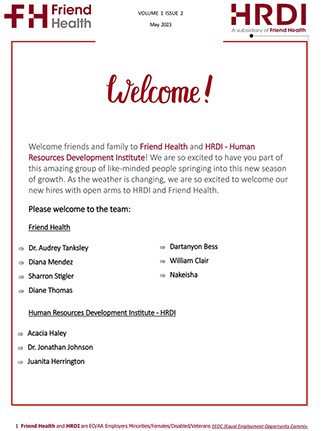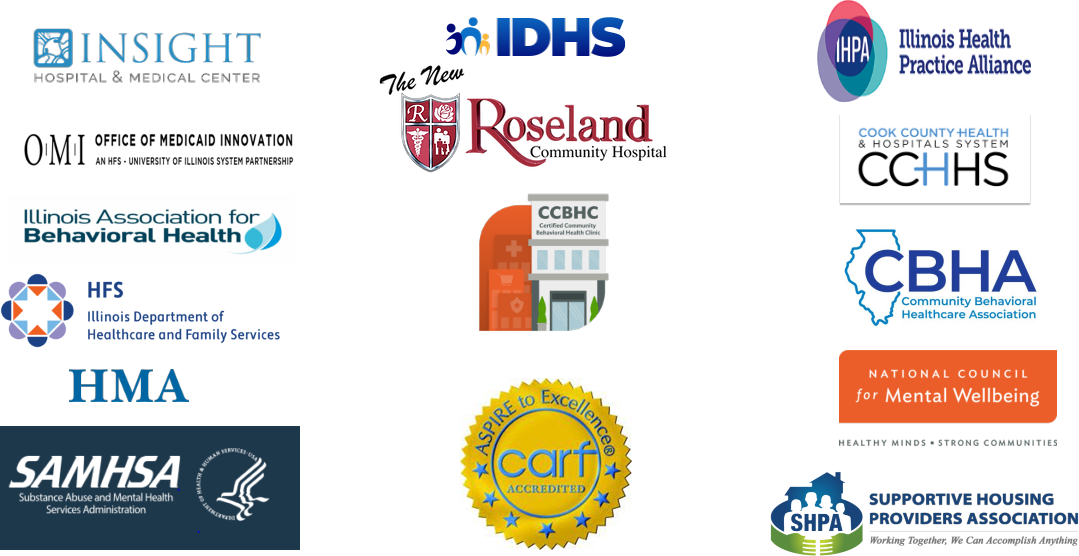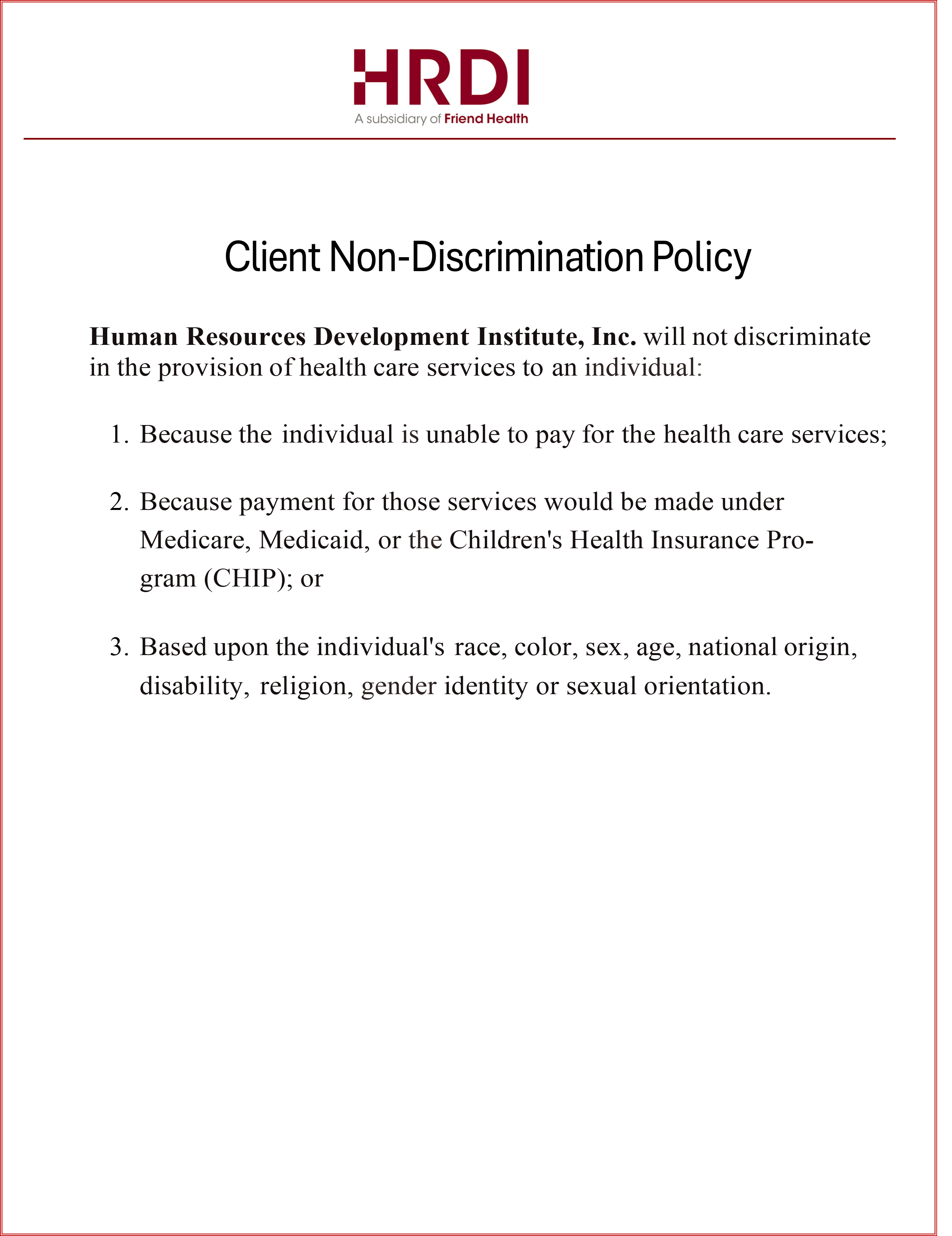
Mission: To improve community health by providing access to high-quality, whole person care.
Vision: To be the community health provider of choice.
WELCOME TO HRDI
HRDI was founded by Dr. C. Vincent Bakeman and Doris M. Lomax, partially in response to a lack of adequate and culturally appropriate treatment options on the south side of Chicago.
Anchored on Chicago’s South Side, HRDI clinics have provided support to underserved communities since 1974. We use evidenced based (as well as evidenced informed) models of care to empower individuals, families and communities to improve their quality of life, regardless of their ability to pay.
If you or a loved one needs help call 773-291-2500
Leadership Team:
Eugene Humphrey
Executive Director
Eugene Humphrey has served as Executive Director of HRDI since August of 2021. Mr. Humphrey previously served as Founding Executive Director of Centers for Residential Alternatives. Prior to joining CRA Eugene served as Director of Physician Services, International and Executive Health programs at the University of Chicago Medicine. Eugene received a Master of Business Administration in Management and Operations, from Purdue University, a Master of Arts in Public Administration and a Bachelor of Arts in Political Science from Eastern Illinois University.
Deborah Parnell
Vice President, Clinical Strategies
Deborah Parnell currently serves as Vice President, Clinical Strategies. Deborah’s tenure with HRDI extends back to 2010, she has served in capacities that range from V.P. of Clinical Operation to Nursing Supervisor. Ms. Parnell previously served as the Clinical Leader at Reliable Health Care. Prior to joining Reliable Health Care Deborah was the RN First Assistant of Cardiac Surgery at St. Francis Hospital. Deborah received a Master of Science in Healthcare Administration and a Bachelor of Science in Nursing from the University of St. Francis, and a nursing diploma from the legendary Michael Reese School of Nursing. Deborah is a licensed Registered Nurse and Certified Alcohol and Drug Counselor.
Antoine Marion
Director, Division Substance Use, Prevention & Recovery
Antoine Marion currently serves as Director, Division Substance Use, Prevention & Recovery programs and services. Antoine’s tenure with HRDI extends back to 2006, he has served in capacities that range from Counselor to Program Manager. Prior to joining HRDI, Mr. Marion served as Clinical Technician at Haymarket Center. Antoine received a Bachelor of Arts from Roosevelt University and is a Certified Alcohol and Drug Counselor.
LaToya Tanniehill
Director, Division Mental Health and Wellbeing
Latoya Tanniehill currently serves as Director, Division Mental Health and Wellbeing. Latoya’s tenure with HRDI extends back to 2014, she has served in capacities that range from Clinical Therapist to Program Supervisor. Prior to joining HRDI, Ms. Tanniehill served as Mental Health Therapist at the Sadie Waterford Center. Latoya received a Bachelor of Social Work from Governors State University, Master of Social Work from the University of Illinois’ Jane Addams College of Social Work and is a License Clinical Social Worker.
Terri Gandy
Director, Division of Prevention & Support Services
Terri’s tenure with HRDI extends back to 2003, she has served in the capacity of Divisional Director encompassing multiple programs and services. Prior to rejoining HRDI, Ms. Gandy served as Senior Director at Christian Community Health Centers. Terri received a Master Degree in Human Service from Chicago State University and a Master Degree from the Erickson Institute with a concentration in Infant Mental Health.
Monique Simmons
Director, Division of Access, Care Coordination & Community Integration
Monique Simmons currently serves as the Director for Access, Care Coordination, and Community Integration at HRDI. Monique joined HRDI in 2025. Prior to joining HRDI, Monique held management roles in private practice and missioned based organizations focused on advancing behavioral health outcomes and leading successful compliance initiatives related to HEDIS measures. Monique is a Licensed Clinical Social Worker. She received her bachelor's degree from Roosevelt University and her master's in social work from Governors State University.
News
From the desk of: Eugene Humphrey,
Executive Director
To: All Stakeholders
Regarding: Certified Community Behavioral Health Clinic at HRDI Southwest Central 33 East 114th Street
Greetings All!
The U.S. Department of Health and Human Services (HHS) announced Illinois has been selected as one of ten states to participate in the Certified Community Behavioral Health Clinic (CCBHC) Medicaid Demonstration Program designed to expand and improve access to coordinated mental health care and substance use services.
The CCBHC Demonstration Program provides reimbursement through Medicaid for the full cost of services that CCBHCs provide, and at higher rates than community mental health centers previously received for Medicaid customers. HFS anticipates that this program will bring an additional $150 million into Illinois' behavioral health system.
What Does Illinois CCBHC Demonstration Mean to HRDI?
HRDI has received provisional certification amongst nineteen peer organizations across the state to participate in the Illinois CCBHC Demonstration Program.
CCBHCs provide access to a range of services, care coordination and incorporate evidence-based practices and other supports based on a community needs assessment. This includes crisis services that are available 24/7. CCBHCs are also required to provide immediate access to routine outpatient care.
CCBHC Scope of Services:
CCBHC Demonstration locations must meet rigorous established criteria for care coordination, service delivery, crisis response, and are evaluated by a common set of quality measures.
CCBHCs must provide nine (9) core services directly or through a designating collaborative organization (DCO). The nine services are:
- Crisis mental health services, including 24-hour mobile crisis teams, emergency crisis intervention services, and crisis stabilization.
- Screening, assessment, and diagnosis, including risk assessment.
- Customer-centered treatment planning or similar processes, including risk assessment and crisis planning.
- Outpatient mental health and substance use services.
- Outpatient clinic primary care screening and monitoring of key health indicators and health risk.
- Targeted case management.
- Psychiatric rehabilitation services.
- Peer support and counselor services and family supports.
- Intensive, community-based mental health care for members of the armed forces and veterans, particularly those members and veterans located in rural areas.
The CCBHC model of care represents a vital transformation toward health equity for the substantial Medicaid-eligible population, the uninsured, and others in our underserved, high-need communities.


Accreditiations, Certifications & Affilitions

Commitment
To Quality
What Our Consumers are saying
The HRDI Quality Team collected and analyzed satisfaction data from consumers receiving supports across the thirty HRDI programs.











Client Right and Privacy Policy
Client Right and Privacy Policy
Your health record contains personal information about you and your health. Protected Health Information ("PHI") is information about you, including demographic information, that may identify you and that relates to your past, present, or future, physical, mental, or behavioral health condition and related health care services.
On line Privacy Statement
 HRDI is
committed to the confidentiality and privacy of your personal information. We do not sell,
distribute or otherwise disclose your personal information to third parties of any kind.
HRDI is
committed to the confidentiality and privacy of your personal information. We do not sell,
distribute or otherwise disclose your personal information to third parties of any kind.
Notice of Client Rights & Privacy Policy Under the Health Insurance Portability and Accountability ACT (HIPAA) of 1966.
HRDI is committed to protecting the privacy and confidentiality of your records. This notice has been prepared in response to federal and state regulations that enforce HIPAA. The regulations contain legal requirements regarding how we at HRDI must protect your health and service records.
This notice describes how medical, mental health, and social service information about you may be used and disclosed, and how you can get access to this information. Please review this notice carefully. A copy of this notice will be provided to all clients receiving services at HRDI.
How We May Use and Disclose Your Health Information
 For
Treatment: Your PHI may be used and disclosed by your physician, counselor, program staff and
others outside of our program who are involved in your care for the purpose of providing,
coordinating, or managing your health care treatment and any related services. This includes
coordination or management of your health care with a third party, consultation with other health
care providers or referral to another provider for health care treatment. For example, your
protected health information may be provided to the state agency that referred you to our program to
ensure that you are participating in treatment. In addition, we may disclose your protected health
information from time-to-time to another physician or health care provider (e.g., a specialist or
laboratory) who, at the request of the program, becomes involved in your care. Except for emergency
services, we will not send your PHI to an outside health care provider who is caring for you unless
you give us written authorization to do so.
For
Treatment: Your PHI may be used and disclosed by your physician, counselor, program staff and
others outside of our program who are involved in your care for the purpose of providing,
coordinating, or managing your health care treatment and any related services. This includes
coordination or management of your health care with a third party, consultation with other health
care providers or referral to another provider for health care treatment. For example, your
protected health information may be provided to the state agency that referred you to our program to
ensure that you are participating in treatment. In addition, we may disclose your protected health
information from time-to-time to another physician or health care provider (e.g., a specialist or
laboratory) who, at the request of the program, becomes involved in your care. Except for emergency
services, we will not send your PHI to an outside health care provider who is caring for you unless
you give us written authorization to do so.
For Payment: Examples of payment-related activities are: making a determination of eligibility or coverage for insurance benefits, processing claims with your insurance company, reviewing services provided to you to determine medical necessity, or undertaking utilization review activities. If you are in a substance abuse treatment program, we will not use your PHI to obtain payment for your health care services without your written authorization. If you are in a mental health program, we may use your PHI to obtain payment for your health care services without your written authorization.
For Health Care Operations: We may use or disclose, as needed, your PHI in order to support the business activities of our program including, but not limited to, quality assessment/assurance/ improvement activities, employee review activities, training of students, licensing, accreditation, and conducting or arranging for other business activities. For example, we may use a sign-in sheet at the registration desk where you will be asked to sign your name and indicate your physician or counselor. We may also call you by name in the waiting room when it is time to be seen. We may share your PHI with third parties that perform various business activities (e.g., billing or typing services) for HRDI provided we have a written contract with the business that prohibits it from re-disclosing your PHI and requires it to safeguard the privacy of your PHI.
With Authorization: We must obtain written authorization from you for other uses and disclosures of your PHI. In general, other uses and disclosures of your PHI will be made only with your written authorization. You may revoke this authorization at any time, unless the program or its staff has taken an action in reliance on the authorization of the use or disclosure you permitted.
Other Uses and Disclosures That Do Not Require Your Authorization
 Required
by Law: We may use or disclose your PHI to the extent that the use or disclosure is required by law,
made in compliance with the law, and limited to the relevant requirements of the law. You will be
notified, as required by law, of any such uses or disclosures. Under the law, we must make
disclosures of your PHI to you upon your request. In addition, we must make disclosures to the
Secretary of the Department of Health and Human Services for the purpose of investigating or
determining our compliance with the requirements of the Privacy Rule.
Required
by Law: We may use or disclose your PHI to the extent that the use or disclosure is required by law,
made in compliance with the law, and limited to the relevant requirements of the law. You will be
notified, as required by law, of any such uses or disclosures. Under the law, we must make
disclosures of your PHI to you upon your request. In addition, we must make disclosures to the
Secretary of the Department of Health and Human Services for the purpose of investigating or
determining our compliance with the requirements of the Privacy Rule.
Health Oversight: We may disclose PHI to a health oversight agency for activities authorized by law, such as audits, investigations, and inspections. Oversight agencies seeking this information include government agencies and organizations that provide financial assistance to the program peer review organizations performing utilization and quality control.
Medical Emergencies: We may use or disclose your PHI in a medical emergency situation to medical personnel only. Our staff will try to provide you a copy of this notice as soon as reasonably practicable after the resolution of the emergency.
Child and Elder Abuse or Neglect: We may disclose your PHI to a state or local agency that is authorized by law to receive reports of child and elder abuse or neglect. However, the information we disclose is limited to only that information which is necessary to make the initial mandated report.
Deceased Patients: We may disclose PHI regarding deceased patients for the purpose of determining the cause of death, in connection with laws requiring the collection of death or other vital statistics, or permitting inquiry into the cause of death.
Research: If you are in a substance abuse treatment or behavioral health program, we may only disclose PHI to researchers if (a) an Institutional Review Board reviews and approves the research and a waiver to the authorization requirement; (b) the researchers establish protocols to ensure the privacy of your PHI; (c) the researchers agree to maintain the security of your PHI in accordance with applicable laws and regulations; and (d) the researchers agree not to re-disclose your protected health information except back to HRDI.
Criminal Activity on Program Premises/Against Program Personnel: We may disclose your PHI to law enforcement officials if you have committed a crime on program premises or against program personnel.
Court Order: We may disclose your PHI if the court issues an appropriate order and follows required procedures.
Interagency Disclosures: Limited PHI may be disclosed for the purpose of coordinating services among government and community based programs that provide mental and/or behavioral health services where those programs have entered into an interagency agreement.
Public Safety: If you are in a mental health treatment program only, we may disclose PHI to avert a serious threat to health or safety, such as physical or mental injury being inflicted on you or someone else.
Your Rights Regarding Your PHI
Right of Access to Inspect and Copy: You have the right, which may be restricted in certain circumstances, to inspect and copy PHI that may be used to make decisions about your care. We may charge a reasonable, cost-based fee for copies.
Right to Amend: If you feel that the PHI we have about you is incorrect or incomplete, you may ask us to amend the information although we are not required to agree to the amendment.
Right to an Accounting of Disclosures: You have the right to request an accounting of the disclosures that we make of your PHI. We may charge you a reasonable fee if you request more than one accounting in any 12-month period.
Right to Request Restrictions: You have the right to request a restriction or limitation on the use of your PHI for treatment, payment, or health care operations. We are not required to agree to your request.
Right to Request Confidential Communication: You have the right to request that we communicate with you about medical matters in a certain way or at an appropriate location.
Right to File a Complaint: You have the right to file a complaint in writing to us or to Equip for Equality or the Illinois Guardianship and Advocacy Commission (please see below) if you believe we have violated your privacy rights.
Right to a Copy of this Notice: You have the right to a copy of this notice.
Rights of the Person’s Served
 HRDI
is committed to following all laws and regulations that benefit the rights of the consumer.
This list in not intended to be a complete list of all of your rights but a summary of the rights
available to you. As a consumer of the Human Resource Development Institute Inc., you have the
following rights:
HRDI
is committed to following all laws and regulations that benefit the rights of the consumer.
This list in not intended to be a complete list of all of your rights but a summary of the rights
available to you. As a consumer of the Human Resource Development Institute Inc., you have the
following rights:
1. You have the same legal rights as any other person within the State of Illinois and the United States.
2. Your access to services will not be denied on the basis of race, religion, ethnicity, disability, sexual orientation, or HIV status.
3. Your services will be provided in the least restrictive environment available.
4. You have the right to be treated with dignity and respect by the HRDI Personnel.
5. You have the right to a reasonable privacy.
6. You have the right to a safe and comfortable environment.
7. You have the right to be fully informed about the HRDI diagnostic and treatment procedures, their purposes, their anticipated outcomes, and any risk from the procedures of the programs.
8. You have the right to refuse to participate in any residential or outpatient activity or prescribed treatment; however, the HRDI treatment staff reserve the right to discontinue your treatment should your refusal to participate make responsible and reasonable treatment impossible.
9. You have the right to review you client records (charts) under the Supervision of a HRDI clinical treatment staff member who can interpret the specific record accurately. A request to review your records must be made by you to the Program Supervisor and Clinical Director.
10. You have the right to confidentiality of your medical information.
11. You have the right to examine and have an explanation of your bill. You may speak to the Program Supervisor for that information.
12. You have the right to be free from abuse, neglect, humiliation, and financial exploitation.
13. You have the right to be free from any form of restraint or seclusion used as a means of coercion, discipline, or retaliation
14. You have the right to have HRDI find an interpreter for you if you do not speak English.
15. You have the right to lodge complaints and appeals regarding services, agency staff, or the agency as an entity without retaliation or discontinuation of service. You have the right to the following agency wide Consumer Complaint Procedures”.
CONSUMER COMPLAINT PROCEDURE
HRDI is committed to addressing consumer needs and concerns and encourages consumers to notify use whenever they have a complaint about service. If you have a service complaint, you can formally inform HRDI of your complaint by using HRDI’s Consumer Complaint Procedure. We will use our best efforts to resolve your complaint, and if we are unable to resolve your complaint or your complaint requires further attention, we will assist you contacting the appropriate outside agency that will work to find a solution to your problem.
Please note that making a complaint will not result in any retaliation or a barrier to service.
To make a formal complaint:
You are encouraged to first notify your assigned primary service provider (counselor, case manager, clinician) that you have a complaint. Your assigned primary service provider will request that you explain the circumstances surrounding your complaint, and will work to resolve your complaint.
If your primary service provider is unable to resolve your complaint to your satisfaction or your complaint involves your primary service provider, you should then request to speak to the Program Supervisor. The Program Supervisor will request that you explain the circumstance surround your complaint, and will then work to resolve your complaint.
If the situation is still not resolved to your satisfaction after speaking with the Program Supervisor or the complaint involves the Program Supervisor, you can make a formal written complaint to HRDI’s Medical Director. Ask any staff member for a Consumer Complaint Form. The staff member will be responsible for sending your Consumer Complaint Form to HRDI’s Medical Director. The staff member is also responsible for providing you with a copy of the completed Consumer Complaint Form.
The Medical Director will review your Consumer Complaint Form and provide you with a written response detailing the actions that HRDI will take to address your complaint. You should receive a response from the Medical Director within 3-5 business days, depending on the nature and urgency of your complaint.
If the complaint is resolved, no further action will be necessary. However, if the complaint warrants further attention, the final resource available is a review with a external advocacy and rights organization.
Access to Advocacy and Rights Organizations
The violation of HIPAA by HRDI is a crime. If you suspect a violation you may file a report to the appropriate authorities in accordance with applicable law, including:
Equip for Equality
20 North Michigan Avenue, Suite 300 Chicago, Illinois 60602
(800) 537-2632
Guardianship and Advocacy Commission Legal Advocacy Service
P.O. Box 7009 Hines, Illinois 60141-7009
(866) 274-8023
Department of Human Services
401 South Clinton Street Chicago, Illinois 60601
(800) 843-6154
Department of Children and Family Services
100 West Randolph Street, 6th Floor Chicago, Illinois 60601
(312) 814-4650
Illinois Office of Inspector General
160 North LaSalle Chicago, Illinois 60601
(800) 368-1463
The U.S. Department of Health and Human Services
200 Independence Avenue, S.W.
Washington, D.C. 20201
Toll Free: (877) 696-6775
You can request a written copy of this notice by contacting HRDI at (773) 966-0333. HRDI reserves the right to change the terms of this policy and will make reasonable efforts to notify service recipients of any changes to this policy.
Sliding Fee Discount Policy

